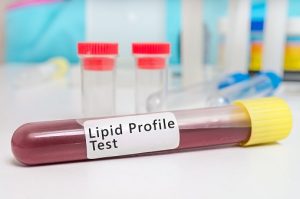 Elevated cholesterol and triglycerides increase prostate cancer recurrence risk, according to research. Researcher Emma Allott said, “While laboratory studies support an important role for cholesterol in prostate cancer, population-based evidence linking cholesterol and prostate cancer is mixed. Understanding associations between obesity, cholesterol, and prostate cancer is important, given that cholesterol levels are readily modifiable with diet and/or statin use, and could therefore have important, practical implications for prostate cancer prevention and treatment.”
Elevated cholesterol and triglycerides increase prostate cancer recurrence risk, according to research. Researcher Emma Allott said, “While laboratory studies support an important role for cholesterol in prostate cancer, population-based evidence linking cholesterol and prostate cancer is mixed. Understanding associations between obesity, cholesterol, and prostate cancer is important, given that cholesterol levels are readily modifiable with diet and/or statin use, and could therefore have important, practical implications for prostate cancer prevention and treatment.”
“Our findings suggest that normalization, or even partial normalization, of serum lipid levels among men with dyslipidemia [abnormal lipid profile] may reduce the risk of prostate cancer recurrence,” she added.
Advertisement
The researchers analyzed data from 843 men who underwent radical prostatectomy after a prostate cancer diagnosis and never took statins prior to surgery. Those men who had high triglyceride levels had a 35 percent higher risk for prostate cancer recurrence compared to those with normal triglyceride levels. High triglycerides were defined as being over 150 mg/dL.
For every 10 mg/dL increase in HDL cholesterol, the risk of prostate cancer recurrence was reduced by 39 percent. HDL cholesterol is considered the good cholesterol type.
Allott added, “Given that 45 percent of deaths worldwide can be attributed to cardiovascular disease and cancer, with prostate cancer being the second most common cause of male cancer deaths in the United States, understanding the role of dyslipidemia as a shared, modifiable risk factor for both of these common causes of mortality is of great importance.”
Tips to lower triglycerides and boost HDL cholesterol
Having high LDL cholesterol and triglyceride levels can raise serious health concerns, so it’s important to boost HDL cholesterol and lower triglyceride levels to maintain good health. Here are some tips to try.
- Lose weight.
- Cut out sugar – the American Heart Association (AHA) recommends that only five percent of your daily calories come from added sugar.
- Increase your fiber intake.
- Limit fructose – fructose is a type of sugar that can contribute to high triglyceride levels.
- Eat a moderately low-fat diet – a moderately low-fat diet has been shown to be more effective at lowering triglyceride levels as opposed to a strict low-fat diet. The AHA suggests that 25 to 35 percent of your daily calories should come from fat.
- Be mindful of the fat you eat – there are good fats and bad fats. Avoid saturated and trans fats, and lean more towards monounsaturated or polyunsaturated fats typically found in olive oil, for example.
- Increase your fish intake – try salmon and sardines.
By following these tips and working closely with your doctor, you can have much success in lowering your triglyceride levels and protecting your heart.
